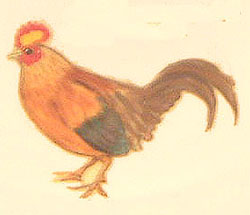|
| Query: Caterpillar | Result: 1439th of 1696 | |
Sri Lanka Junglefowl (Gallus lafayetii) - Wiki
| Subject: | Sri Lanka Junglefowl (Gallus lafayetii) - Wiki
| |

| Resolution: 250x215
File Size: 18381 Bytes
Date: 2000:01:24 13:01:41
Camera: FinePix4700 ZOOM (FUJIFILM)
F number: f/2.8
Focal Length: 940/100
Upload Date: 2007:09:16 19:33:21
|
Sri Lanka Junglefowl
From Wikipedia, the free encyclopedia
[Photo] Sri Lanka Junglefowl by http://en.wikipedia.org/wiki/User:Jimfbleak
The Sri Lanka Junglefowl, Gallus lafayetii, is a member of the pheasant family which is endemic to Sri Lanka. It is a close relative of the Indian Red Junglefowl, Gallus gallus, the wild junglefowl from which the chicken was domesticated.
These are large birds, with colourful male plumage, but are sometimes difficult to see in the denser woodlands. It is common in forest and scrub habitats, and can usually be seen at sites such as Kitulgala, Yala and Sinharaja.
This is one of four species of bird in the genus Gallus. It is a ground nesting bird, which lays 2-4 eggs in a nest. As with many birds in the pheasant family, the colourful male plays no part in the incubation of the eggs or rearing of the precocial young. These duties are performed by the drab and well-camouflaged female.
The male Sri Lanka Junglefowl ranges from 66-73 cm long. It is chicken-like in structure, and has orange-red body plumage, and dark purple wings and tail. The back of the head and the neck are golden, and the face has bare red skin and wattles. The comb is red with a yellow centre. Unlike other junglefowl, the cock does not have an eclipse plumage.
The female is much smaller, at only 35 cm. She is mainly brown with white patterning on the lower belly and breast.
Like most of the pheasant family, Sri Lanka Junglefowl is a terrestrial species. It scratches vigorously for various seeds, fallen fruit and insects.
It is the national bird of Sri Lanka. The scientific name commemorates the French aristocrat Gilbert du Motier, marquis de La Fayette.
This species is closely related to the Grey Junglefowl and more distantly related to the Red Junglefowl. Ecologically speaking, the Singhalese Junglefowl shares much in common with the aberrant Green Junglefowl Gallus varius. Like the Green Junglefowl, Singhalese Junglefowl are island species that have evolved side by side with their similarly stranded island predators and competitors. Uniquely complex anti-predator behaviors and foraging strategies are integral components in the long evolutionary story of the Singhalese Junglefowl.
Like the Grey and Green Junglefowl, male Singhalese Junglefowl play an active role in nest protection and chick rearing.
Singhalese Junglefowl are perhaps best described as serial monogamists. The reproductive strategy of this species may also be described as facultative polyandry as a single female is typically linked with two or three males that form a pride of sorts. These males are likely to be siblings. The female pairs with the alpha male of the pride, and nests often high off the ground. Her eggs are highly variable in colour and hue, but very generally they are cream with a yellowish or pinkish tint. They are often spotted in purple or brownish spots. Occasionally a female will produce flower pot red eggs or eggs blotched heavily in the colour.
Incubating the eggs by herself the female is watched over by her mate who perches in close proximity at all times through the nesting period. The beta males remain in close proximity as well guarding the nesting territory from terrestrial intruders especially those non-obligatory predators that prey on eggs and chicks so well known in every forest assemblage. Singhalese Junglefowl are unique amongst the junglefowl in the brevity of their incubation which may be as short as twenty days as contrasted with the 21-26 days of the Green Junglefowl.
The chicks are fragile and require live food especially terrestrial crustaceans, for example copepods and jungle floor versions of the familiar sow and pill bugs.
The larvae of land crabs are also highly important to the growth and survivability of the juvenile and subadult Singhalese Junglefowl. In captivity this species is particularly vulnerable to pulloram and other bacterium common in domestic poultry.
The chicks and to a slightly lesser extent the adults, are incapable of utilizing vegetable protein and fat. Their dietary requirements can not be met with commercial processed food materials. As a result they are exceedingly rare in captivity.
http://en.wikipedia.org/wiki/Sri_Lanka_Junglefowl
| The text in this page is based on the copyrighted Wikipedia article shown in above URL. It is used under the GNU Free Documentation License. You may redistribute it, verbatim or modified, providing that you comply with the terms of the GFDL. |
|
Comments |
|---|
| | Guest |
|
Scientific Name: Gallus lafayettii Lesson, 1831
Synonyms: Gallus lafayetii, Gallus lafayettei
Common Names: Sri Lanka Junglefowl, Sri Lankan Junglefowl, Ceylon Junglefowl
French: Coq de Lafayette German: Ceylonhuhn Spanish: Gallo de Ceilán
Taxonomy: Gallus Lafayetii Lesson, 1831, India; error = Sri Lanka. |
^o^
Animal Pictures Archive for smart phones
^o^
|
|
|

